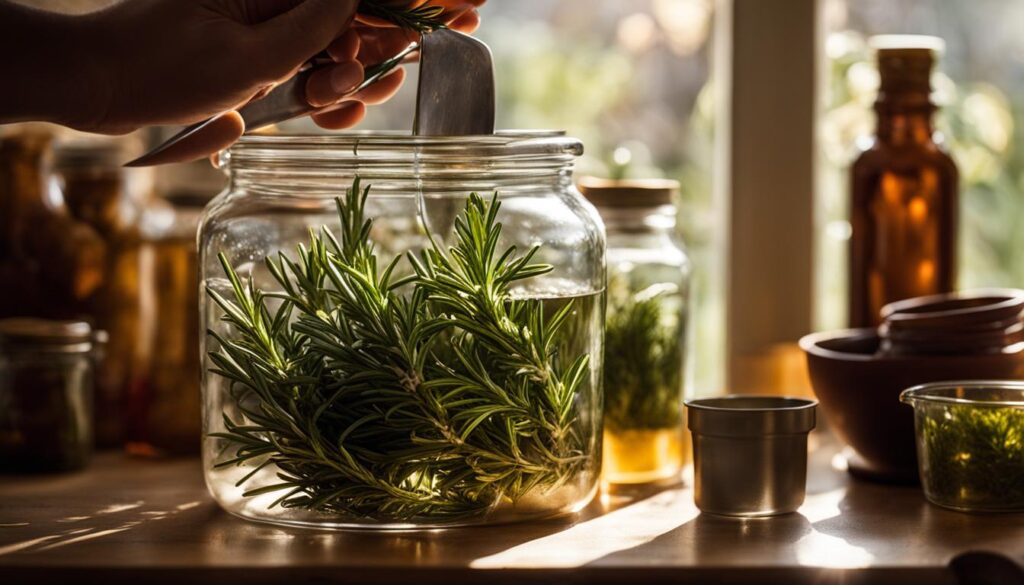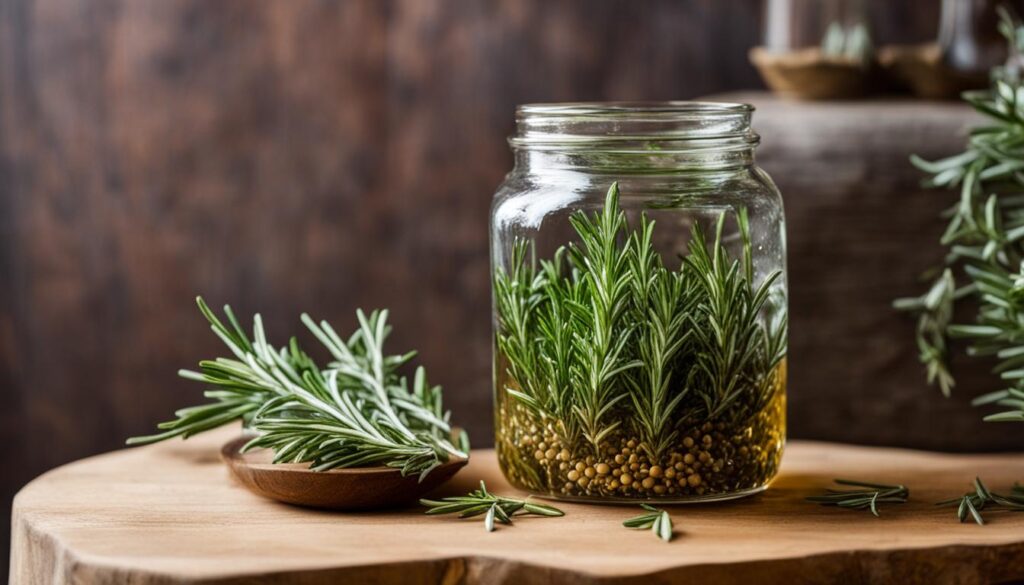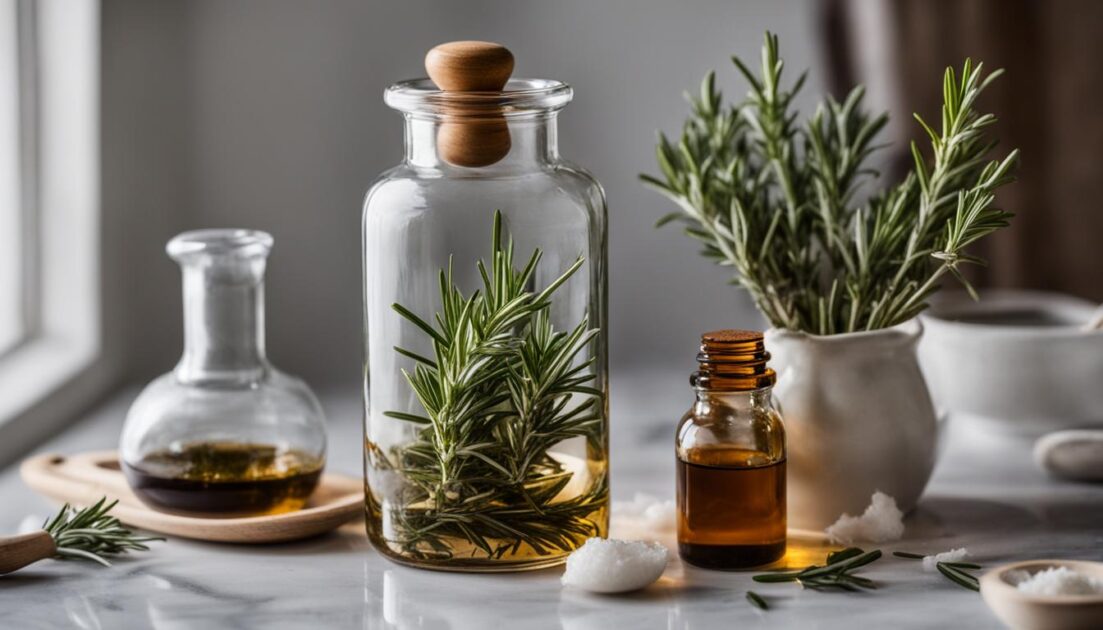Making your own rosemary extract at home is a simple and cost-effective way to enjoy the benefits of this aromatic herb. With just a few easy steps, you can create a natural rosemary extract that can be used for various purposes. From enhancing the flavor of your culinary creations to promoting hair growth and improving memory, homemade rosemary extract offers a range of uses. In this guide, I will walk you through the process of making rosemary extract at home, providing you with a step-by-step recipe and tips for storage and usage.
Key Takeaways:
- Learn how to make your own rosemary extract at home.
- Discover the benefits of using homemade rosemary extract.
- Explore various ways to incorporate rosemary extract into your culinary creations.
- Find out how to use rosemary extract in DIY beauty products.
- Get tips for storing and using homemade rosemary extract.
Benefits of Rosemary Extract
Rosemary extract offers a wide range of benefits that can contribute to your overall well-being. This natural extract has been used for centuries due to its medicinal properties, which are attributed to its antioxidant, anti-inflammatory, and antimicrobial effects. Incorporating rosemary extract into your routine can provide numerous advantages for both your health and beauty.
Improved Memory and Cognitive Function
Rosemary extract has long been associated with memory enhancement and improved cognitive function. Studies have shown that certain compounds found in rosemary, such as rosmarinic acid, may help protect the brain against oxidative damage and potentially prevent age-related cognitive decline.
Promotes Hair Growth and Soothes the Scalp
The use of rosemary extract for hair care is well-documented. It is known to stimulate hair follicles, promoting hair growth and preventing hair loss. Additionally, rosemary extract has soothing properties that can calm an irritated scalp and help alleviate conditions like dandruff.
A Natural Remedy for Dandruff
With its antimicrobial and anti-inflammatory properties, rosemary extract can be an effective natural remedy for dandruff. The extract’s active compounds can help reduce scalp irritation, control excess oil production, and combat the growth of dandruff-causing fungi.
Enhance Culinary Creations
Besides its health benefits, rosemary extract is a versatile ingredient that can add depth of flavor and aromatic notes to a variety of dishes. Whether you’re preparing soups, sauces, or marinades, incorporating rosemary extract can elevate the taste and aroma of your culinary creations.
Use in DIY Beauty Products
Rosemary extract is a popular ingredient in DIY beauty products due to its antioxidant and antimicrobial properties. Adding rosemary extract to soaps, lotions, and hair masks can provide nourishment to the skin, help combat acne-causing bacteria, and promote overall skin health.
Incorporating rosemary extract into your daily routine can offer numerous benefits for your health, beauty, and culinary endeavors. By harnessing the power of this natural extract, you can enjoy its therapeutic effects and enhance both your physical and mental well-being.
How to Make Rosemary Extract
Making rosemary extract at home is a simple process that requires just a few ingredients and minimal effort. To start, you will need fresh or dried rosemary sprigs and a carrier oil, such as olive oil or jojoba oil. The method involves infusing the rosemary in the oil, allowing its beneficial compounds to be extracted. You can choose between two methods: heat infusion or cold infusion.
The heat infusion method involves heating the rosemary and oil mixture on the stove. This method allows for a quicker extraction of the rosemary’s properties. Here’s a step-by-step guide to making rosemary extract using the heat infusion method:
- Begin by coarsely chopping the rosemary sprigs to release their flavors.
- In a small saucepan, combine the chopped rosemary and carrier oil.
- Heat the mixture over low heat for about 1-2 hours, stirring occasionally to prevent burning.
- Once the oil has infused with the rosemary fragrance, remove the saucepan from heat and let it cool.
- Strain the oil through a fine-mesh sieve or cheesecloth to remove any plant matter.
- Transfer the strained oil into a dark glass bottle for storage.
If you prefer a more hands-off approach, you can opt for the cold infusion method. This method involves allowing the rosemary to infuse in the oil at room temperature over a longer period of time. Here are the steps to make rosemary extract using the cold infusion method:
- Place the rosemary sprigs in a clean glass jar.
- Pour the carrier oil over the rosemary, making sure it is completely submerged.
- Seal the jar tightly and let it sit at room temperature for 4-6 weeks.
- Gently shake the jar every few days to distribute the flavors.
- After the infusion period, strain the oil and transfer it to a dark glass bottle for storage.
Tips for Storage and Usage
Once your rosemary extract is ready, it’s important to store it properly to maintain its freshness and potency. Infused oils should be stored in a cool, dark place, away from direct sunlight and heat. This will help preserve the beneficial properties of the extract.
Now that you’ve learned how to make rosemary extract, you can enjoy its versatile uses. Whether you add it to your culinary creations for enhanced flavor or use it in DIY beauty products for its natural benefits, rosemary extract is a valuable ingredient to have on hand.
| Method | Pros | Cons |
|---|---|---|
| Heat Infusion | Quicker extraction of rosemary’s properties | Requires heating and monitoring on the stove |
| Cold Infusion | More hands-off approach | Longer infusion period |

How to Use Rosemary Extract
Rosemary extract offers a wide range of uses that can help you harness its benefits in various ways. Whether you want to enhance the flavors in your culinary creations or incorporate it into your hair and skincare routine, there are countless ways to enjoy the advantages of rosemary extract.
Culinary Applications
In the kitchen, rosemary extract can be a versatile ingredient, adding a burst of flavor and aroma to your dishes. Here are some creative ways to incorporate it:
- Add a few drops of rosemary extract to marinades for grilled meats and vegetables.
- Mix it with olive oil and vinegar to create a fragrant and rich salad dressing.
- Infuse it into oils for a delightful and aromatic base for cooking.
Hair and Scalp Care
Rosemary extract has been used for centuries as a natural remedy for hair care. It can stimulate hair growth, reduce dandruff, and provide nourishment to the scalp. Here’s how to incorporate it into your hair care routine:
- Add a few drops of rosemary extract to your shampoo and conditioner for a revitalizing effect.
- Massage a small amount of rosemary extract directly onto your scalp as a stimulating treatment.
Skincare Benefits
When it comes to skincare, rosemary extract offers antioxidant and antimicrobial benefits. Here are some ways to include it in your DIY skincare products:
- Incorporate rosemary extract into face masks to cleanse and nourish the skin.
- Add a few drops to serums or facial oils for a natural boost of antioxidants.
- Blend it into body oils to moisturize and protect the skin.

With its versatile applications, rosemary extract can elevate your culinary creations and enhance your self-care routines. Experiment with different uses to discover the unique benefits of this remarkable herb.
Storage and Tips
When it comes to homemade rosemary extract, proper storage is key to maintaining its longevity and freshness. To ensure the best results, store your homemade rosemary extract in a dark, glass bottle. This will help protect it from oxidation and maintain its potency over time. It is essential to tightly seal the bottle to prevent air from entering and affecting the extract’s quality.
For optimal preservation, keep the bottle in a cool, dry place away from direct sunlight and heat. Exposure to heat and light can degrade the extract and reduce its effectiveness. By storing it in the right conditions, your homemade rosemary extract can last for up to a year, allowing you to enjoy its benefits over an extended period.
It’s important to note that homemade extracts may not have the same shelf life as commercially produced ones. To ensure freshness and potency, it is advisable to make small batches of rosemary extract at home and use them within a reasonable time frame. This way, you can always have a fresh supply of natural rosemary extract ready for your culinary and beauty needs.
When using your homemade rosemary extract, start with a small amount and adjust according to your taste preferences and the desired intensity of flavor. Remember, a little goes a long way, as the concentrated nature of the extract means even a small quantity can bring robust flavor to your dishes. Enjoy the versatility and cost-effectiveness of homemade rosemary extract as you incorporate it into various culinary creations and beauty recipes.
FAQ
How do I make homemade rosemary extract?
To make homemade rosemary extract, you will need fresh or dried rosemary sprigs and a carrier oil, such as olive oil or jojoba oil. The process involves infusing the rosemary in the oil, either through heat infusion or cold infusion. Once infused, the mixture is strained and stored in a cool, dark place for future use.
What are the benefits of rosemary extract?
Rosemary extract has numerous benefits, including improving memory and cognitive function, promoting hair growth, soothing the scalp, and providing a natural remedy for dandruff. It can also be used to enhance the flavor and aroma of culinary dishes and incorporated into DIY skincare products for antioxidant and antimicrobial benefits.
How can I use rosemary extract?
Rosemary extract can be used in various ways. In cooking, it can be added to dishes during cooking, used in marinades, salad dressings, and infused oils. For hair care, it can be added to shampoos and conditioners or massaged into the scalp as a treatment. It can also be incorporated into DIY skincare products, such as face masks, serums, and body oils.
How should I store homemade rosemary extract?
To ensure the longevity and freshness of homemade rosemary extract, it should be stored in a dark, glass bottle that is tightly sealed. Keep the bottle in a cool, dry place away from direct sunlight and heat. Properly stored, homemade rosemary extract can last up to a year.






